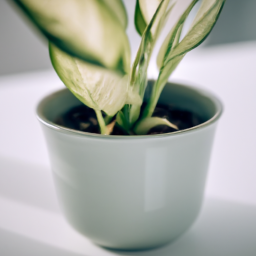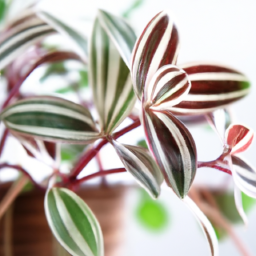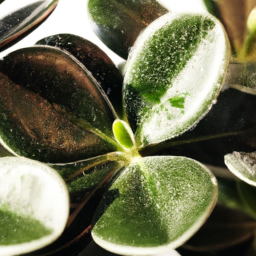
Are you looking for a way to enhance your productivity while working from home? Look no further than plants! Yes, you read that right – plants can actually boost productivity in home offices. Adding a touch of greenery to your workspace not only adds aesthetic appeal but also has numerous benefits for your focus, creativity, and overall well-being. In this blog post, we will explore some of the best plants that boost productivity in home offices, helping you create a more productive and inspiring work environment. So, whether you’re a freelancer, a remote worker, or simply someone who wants to make the most of their home office space, keep reading to discover how these plants can transform your workday.
Benefits of Having Plants in Home Offices for Improved Productivity
Working from home has become increasingly popular in recent years, and with the current global situation, it has become the norm for many individuals. However, creating a productive and inspiring work environment at home can be challenging. One effective way to enhance productivity and create a pleasant workspace is by incorporating plants into your home office.
Reduced Stress and Improved Well-being
Plants have a remarkable ability to reduce stress and improve overall well-being. Studies have shown that being in the presence of plants can lower blood pressure, reduce anxiety, and promote a sense of calmness. This is especially important in home offices where stress levels can be high due to work-related pressures or distractions.
Furthermore, plants release oxygen and absorb carbon dioxide, improving air quality and creating a healthier environment. Breathing in fresh and clean air can have a significant impact on your mood and concentration, ultimately boosting productivity.
By strategically placing plants in your home office, you can create a soothing and tranquil atmosphere that promotes a sense of well-being and reduces stress levels, leading to improved productivity.
Enhanced Focus and Concentration
Having plants in your home office can significantly enhance your focus and concentration. Research has shown that being exposed to nature, even in the form of indoor plants, can improve cognitive function and attention span.
The presence of plants can help reduce mental fatigue and increase your ability to concentrate on tasks. This is especially beneficial when working on complex or demanding projects that require sustained attention.
Additionally, certain plants have specific properties that can further enhance focus. For example, the scent of rosemary has been found to improve memory and alertness. Including plants with such properties in your home office can provide an extra boost to your cognitive abilities.
Increased Creativity and Inspiration
Plants have the power to spark creativity and inspiration. Their vibrant colors and natural beauty can stimulate the imagination and encourage innovative thinking.
Studies have shown that being surrounded by plants can enhance creativity and problem-solving skills. The presence of greenery can evoke feelings of tranquility and relaxation, allowing your mind to wander freely and explore new ideas.
Furthermore, taking short breaks to observe and appreciate your plants can serve as a refreshing mental reset. These moments of respite can rejuvenate your mind, leading to increased productivity and a fresh perspective on your work.
Choosing the Right Plants for Your Home Office
Now that you understand the benefits of having plants in your home office, it’s time to choose the right ones. Here are a few plant recommendations that are known to boost productivity:
1. Snake Plant (Sansevieria trifasciata)
The Snake Plant is a popular choice for home offices due to its low maintenance requirements and air-purifying properties. It releases oxygen at night, making it an ideal plant for improving air quality while you sleep and work during the day. Its long, upright leaves add a touch of elegance to any workspace.
2. Peace Lily (Spathiphyllum)
The Peace Lily is another excellent choice for home offices. It thrives in low-light conditions and helps remove toxins from the air, creating a healthier working environment. Its beautiful white flowers can also add a touch of serenity to your workspace.
3. ZZ Plant (Zamioculcas zamiifolia)
The ZZ Plant is well-known for its ability to thrive in almost any lighting condition, making it perfect for home offices with limited natural light. Its glossy, dark green leaves add a touch of elegance and sophistication to any workspace.
Remember to consider factors such as lighting conditions, maintenance requirements, and personal preferences when choosing plants for your home office. Experiment with different varieties to find the ones that best suit your workspace and enhance your productivity.
Conclusion
Incorporating plants into your home office can have a profound impact on your productivity and overall well-being. They can reduce stress, improve focus and concentration, and enhance creativity and inspiration. Choose plants that are easy to care for and complement your workspace. With the right plants, you can create a harmonious and invigorating environment that promotes productivity and makes working from home a more enjoyable experience.

Top 5 Plant Varieties to Boost Productivity in Home Offices
Welcome to our guide on plants that can boost productivity in home offices. Whether you’re a freelancer, remote worker, or simply someone who enjoys working from the comfort of your own home, incorporating plants into your workspace can have a significant impact on your productivity, focus, and overall well-being. In this article, we will explore the top 5 plant varieties that are known to enhance productivity and create a more conducive work environment.
The Benefits of Plants in Home Offices
Before we dive into the specific plant varieties, let’s take a moment to understand why having plants in your home office can be beneficial. Research has shown that plants have a range of positive effects on our mental and physical well-being, including:
1. Improved Air Quality: Plants act as natural air purifiers, filtering out toxins and releasing oxygen. This can help reduce the presence of harmful substances in the air, such as volatile organic compounds (VOCs), which are commonly found in office equipment and furniture.
2. Increased Productivity: Studies have found that having plants in the workplace can improve concentration, memory, and cognitive performance. The presence of greenery can also help reduce stress levels and enhance creativity, leading to higher productivity levels.
3. Enhanced Mood and Well-being: Being surrounded by nature has a calming effect on our minds and can contribute to a more positive and relaxed work environment. Plants have been shown to reduce feelings of anxiety and boost overall well-being, making them a valuable addition to any home office.
1. Snake Plant (Sansevieria trifasciata)
The snake plant, also known as mother-in-law’s tongue, is an excellent choice for home offices. It is known for its ability to purify the air by removing toxins such as formaldehyde, benzene, and xylene. Additionally, snake plants are low-maintenance and can thrive in various lighting conditions, making them perfect for those who may not have a green thumb or access to abundant natural light.
These plants have long, upright leaves that are typically dark green with yellow edges, adding a touch of elegance to your workspace. Snake plants are also known to release oxygen at night, which can improve air quality while you sleep, leading to better overall health and well-being.
To care for a snake plant, place it in a well-draining pot and water it sparingly, allowing the soil to dry out between waterings. They can tolerate low light conditions but will thrive in bright, indirect light.
2. Peace Lily (Spathiphyllum)
The peace lily is another popular choice for home offices due to its elegant appearance and air-purifying qualities. It is known to remove toxins such as formaldehyde, benzene, and trichloroethylene from the air, making it an excellent choice for improving indoor air quality.
Peace lilies have dark green leaves and produce beautiful white flowers, adding a touch of beauty and tranquility to your workspace. They thrive in low to medium light conditions, making them suitable for offices with limited natural light.
When caring for a peace lily, keep the soil slightly moist but avoid overwatering. These plants will often droop when they need water, making it easy to determine when it’s time to give them a drink. Regularly wipe the leaves with a damp cloth to keep them clean and free from dust.
3. ZZ Plant (Zamioculcas zamiifolia)
The ZZ plant is a fantastic choice for home offices due to its ability to thrive in low-light conditions and its low-maintenance nature. It has glossy, dark green leaves that add a touch of elegance to any workspace.
One of the main benefits of the ZZ plant is its ability to tolerate neglect and low light. This makes it an ideal choice for those who may not have the time or expertise to care for more demanding plants. ZZ plants are also known for their air-purifying qualities, removing toxins such as xylene and toluene from the air.
To care for a ZZ plant, place it in a well-draining pot and water it sparingly, allowing the soil to dry out between waterings. They can tolerate low light conditions but will thrive in bright, indirect light.
4. Pothos (Epipremnum aureum)
Pothos, also known as devil’s ivy, is a popular choice for home offices due to its low-maintenance nature and its ability to thrive in various lighting conditions. It has heart-shaped leaves that come in a variety of colors, including green, golden, and variegated.
One of the main benefits of pothos is its ability to remove toxins such as formaldehyde, benzene, and xylene from the air, making it an excellent choice for improving indoor air quality. Pothos plants can be grown in water or soil, making them versatile and easy to care for.
To care for a pothos plant, place it in a well-draining pot with a suitable potting mix. Water the plant when the top inch of soil feels dry, and avoid overwatering. Pothos plants can tolerate low to medium light conditions but will thrive in bright, indirect light.
5. Spider Plant (Chlorophytum comosum)
The spider plant is a popular choice for home offices due to its air-purifying qualities and its ability to thrive in various lighting conditions. It has long, arching leaves that are usually green with white stripes, adding a touch of vibrancy to your workspace.
Spider plants are known to remove toxins such as formaldehyde, carbon monoxide, and xylene from the air, making them an excellent choice for improving indoor air quality. They are also relatively easy to care for and can adapt to different light conditions.
To care for a spider plant, place it in a well-draining pot and water it when the top inch of soil feels dry. Spider plants can tolerate low to bright indirect light, but they prefer bright, indirect light for optimal growth.
By incorporating these top 5 plant varieties into your home office, you can create a more productive and enjoyable work environment. Remember to choose plants that suit your lighting conditions and level of maintenance, and don’t be afraid to experiment with different varieties to find the ones that work best for you. Happy gardening and increased productivity in your home office!

Plants that Boost Productivity in Home Offices
Working from home has become increasingly popular, and creating a productive environment is essential for success. One way to enhance productivity in your home office is by incorporating plants. Not only do plants add beauty and freshness to your workspace, but they also provide numerous benefits that can boost your focus, creativity, and overall well-being. In this article, we will explore the top plants that are known to enhance productivity in home offices and provide a step-by-step guide on how to care for them.
The Benefits of Plants in Home Offices
Before diving into the specific plants, let’s take a moment to understand why having plants in your home office is beneficial. Research has shown that plants have a positive impact on productivity, concentration, and overall mood. Here are some key benefits:
1. Improved Air Quality: Plants act as natural air purifiers by absorbing toxins and releasing oxygen. This can help reduce indoor air pollution and improve the overall air quality in your home office, leading to better cognitive function and focus.
2. Stress Reduction: Being surrounded by nature has a calming effect on our minds. Studies have shown that having plants in the workspace can reduce stress levels, increase relaxation, and promote a sense of well-being. This, in turn, can enhance productivity and creativity.
3. Increased Focus and Creativity: Certain plants have been found to enhance cognitive function, memory retention, and creativity. The presence of greenery in your home office can stimulate your brain, improve concentration, and boost your overall productivity.
Top Plants that Boost Productivity in Home Offices
Now that we understand the benefits, let’s explore the top plants that are known to boost productivity in home offices:
1. Snake Plant (Sansevieria trifasciata)
The Snake Plant, also known as Mother-in-Law’s Tongue, is a popular choice for home offices due to its low maintenance and air-purifying properties. It has long, upright leaves that are green with yellow edges, adding a touch of elegance to your workspace. This plant releases oxygen at night, making it an excellent choice for improving air quality while you sleep.
When caring for a Snake Plant, place it in a well-lit area, but away from direct sunlight. It can tolerate low light conditions, making it suitable for various office environments. Water the plant sparingly, allowing the soil to dry out between waterings. Overwatering can lead to root rot, so it’s important to maintain a balanced watering routine.
2. Peace Lily (Spathiphyllum)
The Peace Lily is a beautiful flowering plant that not only adds aesthetic appeal to your home office but also helps purify the air by removing harmful toxins. It has glossy, dark green leaves and white flowers that bloom periodically. This plant thrives in low-light conditions, making it ideal for offices with limited natural light.
To care for a Peace Lily, place it in a shady spot away from direct sunlight. They prefer slightly moist soil, so water them regularly, ensuring the soil is never completely dry. However, be cautious not to overwater, as this can lead to root rot. Misting the leaves occasionally can also help maintain humidity levels.
3. Spider Plant (Chlorophytum comosum)
The Spider Plant is a popular choice for home offices due to its adaptability and air-purifying qualities. It has long, arching leaves that are green with white stripes, creating a visually appealing display. This plant is known for its ability to remove formaldehyde and other harmful chemicals from the air.
When caring for a Spider Plant, place it in a well-lit area with indirect sunlight. They can tolerate a wide range of light conditions, making them suitable for various office environments. Water the plant thoroughly, allowing the soil to dry out between waterings. Spider Plants also produce “spiderettes” or baby plants that can be propagated and shared with others.
Step-by-Step Guide on Caring for Plants in Home Offices
Now that you know the top plants for boosting productivity in home offices, let’s dive into a step-by-step guide on how to care for them:
1. Choosing the Right Location
Assess your home office space and identify suitable locations for your plants. Consider factors such as natural light, temperature, and humidity. Most plants thrive in well-lit areas with indirect sunlight, away from drafts and extreme temperature fluctuations.
2. Selecting the Appropriate Containers
Choose containers that have drainage holes to prevent waterlogging. Opt for containers that complement your office decor and provide enough space for the plant’s root system to grow. Ensure the containers are clean before planting to prevent the spread of diseases.
3. Providing Adequate Watering
Water your plants according to their specific needs. Some plants require more frequent watering, while others prefer drier conditions. Avoid overwatering, as it can lead to root rot. Check the moisture level of the soil regularly and adjust your watering routine accordingly.
4. Monitoring Light Conditions
Observe the lighting conditions in your home office and choose plants that thrive in those conditions. Some plants require bright, indirect light, while others can tolerate low-light environments. Rotate your plants periodically to ensure even growth and prevent them from leaning towards the light source.
5. Maintaining Proper Humidity
Plants have different humidity preferences, and maintaining the right humidity levels can contribute to their overall health. Consider using a humidifier or placing a tray of water near your plants to increase humidity. Misting the leaves occasionally can also help create a humid microclimate.
6. Fertilizing at the Right Time
Provide your plants with the necessary nutrients by fertilizing them at the appropriate time. Use a balanced, water-soluble fertilizer and follow the instructions on the packaging. Avoid over-fertilizing, as it can lead to nutrient burn and damage the plant’s roots.
7. Regularly Inspecting for Pests
Keep an eye out for common pests such as aphids, spider mites, and mealybugs. Regularly inspect your plants for any signs of infestation, such as yellowing leaves or sticky residue. If pests are detected, take immediate action to prevent them from spreading to other plants.
By following these steps and providing proper care, you can create a thriving and productive environment in your home office. Remember to enjoy the process and appreciate the beauty and benefits that plants bring to your workspace.
Here are the Essential Points
If you’ve been feeling a bit sluggish or unproductive while working from home, you might be surprised to learn that the solution could be as simple as adding a few plants to your home office. Not only do plants bring life and beauty to any space, but they also have numerous benefits for our mental and physical well-being. In fact, certain plants have been found to specifically boost productivity and focus, making them the perfect companions for your work-from-home setup.
One of the top plants for enhancing productivity is the ever-popular snake plant. Known for its ability to purify the air by removing toxins, this low-maintenance plant is a great choice for busy individuals. Its long, upright leaves not only create a visually appealing backdrop but also release oxygen, promoting better concentration and reducing stress. Another plant that can work wonders for your productivity is the peace lily. With its elegant white flowers and glossy, dark green leaves, this plant not only adds a touch of elegance to your workspace but also helps to reduce airborne pollutants. Its ability to improve air quality can lead to increased focus and overall well-being, making it an excellent addition to any home office.
Check Out These FAQs:
Q1. What are some plants that can boost productivity in home offices?
A1. There are several plants that can enhance productivity in home offices. Some popular options include:
- Snake Plant: Known for its air-purifying properties, it improves indoor air quality and helps reduce stress.
- Peace Lily: This plant can remove toxins from the air and increase humidity, creating a more comfortable working environment.
- Golden Pothos: It is a low-maintenance plant that helps improve air quality and adds a touch of greenery to your workspace.
- Spider Plant: Effective at removing pollutants, it can help you breathe easier and focus better.
- Aloe Vera: Apart from its healing properties, this plant releases oxygen at night, promoting better sleep and productivity.
Q2. How do plants improve productivity in home offices?
A2. Plants have several benefits that can enhance productivity in home offices. They help purify the air by removing toxins and releasing oxygen, creating a healthier environment. Plants also increase humidity, reducing dryness and discomfort. The presence of greenery can improve mood, reduce stress levels, and enhance focus and concentration. Additionally, caring for plants can provide a sense of responsibility and act as a mindful break from work, boosting overall well-being.
Q3. Can plants in home offices help reduce noise?
A3. While plants cannot completely eliminate noise, some varieties can help absorb sound and reduce its impact. Plants with dense foliage and large leaves, such as rubber plants or fiddle leaf figs, can help soften noise by absorbing sound waves. Additionally, placing plants strategically near walls or windows can help create a barrier that minimizes noise from outside sources.
Q4. How should I care for plants in my home office?
A4. Caring for plants in your home office is relatively simple. Here are a few tips:
- Watering: Ensure your plants receive the appropriate amount of water. Overwatering or underwatering can harm them. Check the soil moisture before watering.
- Light: Different plants have varying light requirements. Place them in areas where they can receive adequate sunlight or provide artificial light if necessary.
- Temperature and Humidity: Most plants thrive in temperatures between 60-75°F (15-24°C) and prefer moderate humidity levels. Avoid placing them near drafts or heating/cooling vents.
- Fertilizer: Use a balanced fertilizer occasionally to provide necessary nutrients. Follow the instructions on the fertilizer packaging.
- Pruning and Cleaning: Remove dead leaves or flowers regularly to maintain the plant’s health and appearance. Wipe dust off the leaves to allow for proper photosynthesis.
Q5. Can I have plants in my home office if I lack natural light?
A5. Yes, you can still have plants in your home office even if natural light is limited. Opt for low-light tolerant plants such as pothos, snake plants, or ZZ plants. These varieties can thrive in artificial light conditions like fluorescent or LED lights. However, it’s important to ensure they receive enough light to sustain their growth. Consider placing them near a window or using grow lights to supplement their light requirements.
Dr. Olivia Green is a botanist with over two decades of experience in indoor plant cultivation. She holds a Ph.D. in Plant Biology and has dedicated her career to researching plant behavior in controlled environments. Dr. Green is passionate about helping plant enthusiasts master the art of indoor gardening through her extensive knowledge and practical insights.


